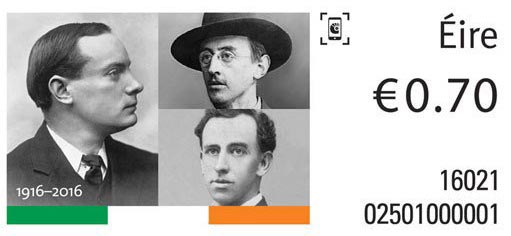 As most Irish people are aware, Thomás MacDonagh the Irish political activist, poet, playwright, educationalist and revolutionary leader was born in Cloughjordan, Co Tipperary. As a signatories to the Proclamation of the Irish Republic, he was executed for his part in the 1916 Easter Rising.
As most Irish people are aware, Thomás MacDonagh the Irish political activist, poet, playwright, educationalist and revolutionary leader was born in Cloughjordan, Co Tipperary. As a signatories to the Proclamation of the Irish Republic, he was executed for his part in the 1916 Easter Rising.
An Post have now issued sixteen 1916 centenary stamps, and huge national and international demand is expected for this 1916-2016 definitive stamp series, which includes an image of the Tipperary born MacDonagh.
The stamps are grouped into four different categories reflecting a chronological progression from the lead-up to the 1916 Rising through to its aftermath. Represented are: Leaders and Icons; Participants; Easter Week and The Aftermath, all designed as a narrative rather than as 16 individual images. These new stamps will be available for the remainder of 2016 at all Post Offices and in special souvenir packs and booklets. [See http://www.anpost.ie/AnPost/IrishStamps/Home/ ]
A huge feature of each set of stamps is the use of ‘Augmented Reality (AR)’ (Latter elements are supplemented by a computer-generated sensory input, involving sound, video and graphics data), thus linking the stamps to a wealth of additional material; through scanning them with the CEE Explorer Smartphone App.
Thomás MacDonagh final communication home.
It is interesting to note that one year after MacDonagh’s death, his wife, whom he had married in 1911, Muriel (née Gifford), drowned in a swimming accident off the Skerries coast, in north Co Dublin, leaving their children, four-year-old Donagh and one-year-old Barbara, orphaned.
His original last letter posted home, currently is not to be found in the National Library of Ireland’s current excellent collection, however a copy truly exists. In this communication MacDonagh laments that his death will leave his family impoverished.
MacDonagh writes; “The one bitterness that death has for me is the separation it brings from my beloved wife Muriel, and my beloved children, Donagh and Barbara. My country will then treat them as wards, I hope. I have devoted myself too much to national work and too little to the making of money to leave them a competence. God help them and support them, and give them a happy and prosperous life.”
Thomás MacDonagh, once, also speaking about Ireland prior to 1916 stated: “This country will be one entire slum unless we get into action, in spite of our literary movements and Gaelic Leagues, it is going down and down. There is no life or heart left in the country.”
One wonders today is the vision and sacrifice MacDonagh dreamed for this country; is it at all reflected in our Ireland one hundred years later in 2016?

Leave a Reply